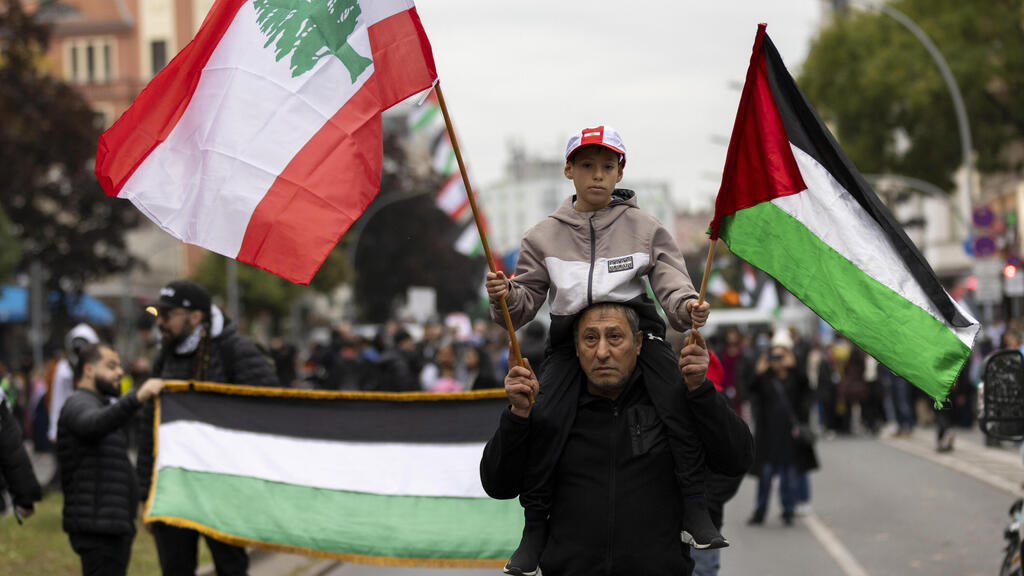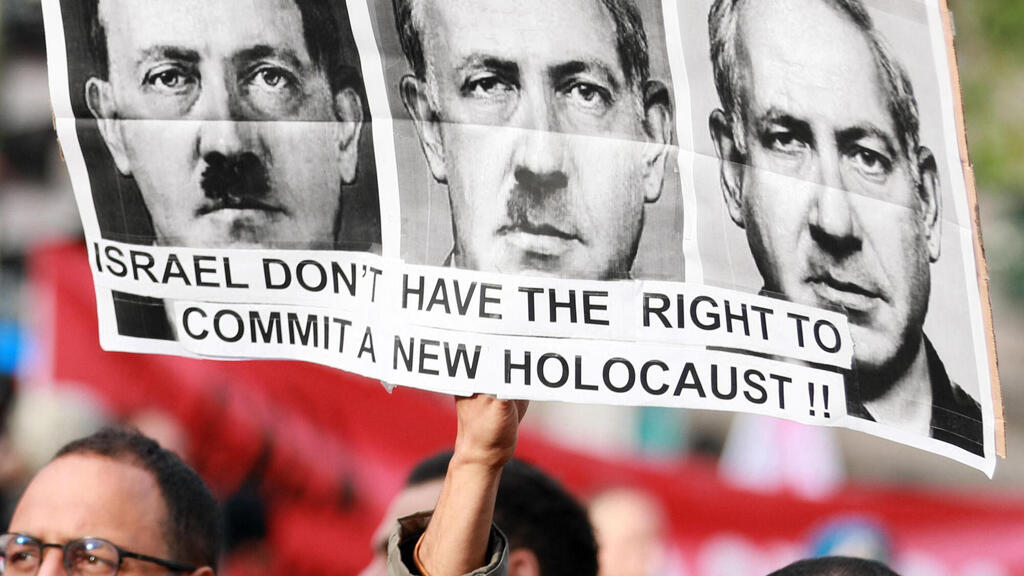Getting your Trinity Audio player ready...
In the heated debate over war and peace in the Middle East, standing with Israel requires considerable courage and conviction at the moment. The pressure to justify that stance has only grown stronger, especially with Israel’s recent ground offensive against Hezbollah in Lebanon.
Those of us who consider themselves friends of Israel are often accused of misguided loyalty to Netanyahu’s divisive government. There’s a strange expectation to publicly criticize Israel first, something I’ve never seen applied to any other country.
Anti-Israel march in Berlin
(Reuters)
As an ally of Israel, it’s almost obligatory to preface your support by cataloging your disagreements with its government. Even among mainstream voices in Germany, the once-clear commitment to Israel’s security, grounded in our historic responsibility for the Holocaust, has weakened.
3 View gallery


Prime Minister Benjamin Netanyahu and German Chancellor Olaf Scholz
(Photo: Stephan Gukler )
What was once an unequivocal “Yes” to protecting the Jewish state has shifted for many to a cautious “Yes, but” with the “but” growing louder and louder. I am increasingly alarmed by the growing equidistance in the German debate.
Let me be clear: I am not a neutral mediator. I am partisan in this conflict. I stand with Israel. Not because I turn a blind eye to the suffering of Palestinian civilians in Gaza. Not because I support an Israeli government that, in parts, is far-right and ultranationalist, and lacks a clear plan for peace. Not because I reject a two-state solution that would finally allow Israelis and Palestinians to live side by side in peace, security, and dignity.
No, I take this public stance so strongly because the German debate currently lacks a noticeable pro-Israel voice. Together with others, I’m trying to fill this gap – whether it’s in talk shows, on social media, or in public discussions.
My country has become unrecognizable to me
I know some view my position as uncritical. But in recent months, I have certainly not had the impression that the rest of Germany is engaged in an uncritical debate about Israel’s military actions against Hamas. On the contrary, I now find the debate to be quite one-sided, as the original cause of this war is barely discussed anymore: the massacre of October 7, 2023, which claimed over 1,200 lives, left deep wounds in Israel, and caused widespread trauma. It was the largest mass murder of Jews since the Holocaust.
An increasing number of Germans no longer see a direct connection between Hamas terror and the war that has been ongoing in Gaza for the past year. While the fighting continues, Israel has already lost the war for public opinion. Hardly anyone speaks anymore about the fate of the 101 Israeli hostages still in Hamas captivity. On the other side, much of society has taken an entirely detached view of Palestinian suffering, where Palestinians are seen solely and exclusively as victims. I’ve been shaken by the fact that people I once respected have expressed solidarity with terror and reinterpreted it as legitimate Palestinian self-determination.
October 7, 2023, has also forced me to reconsider how I view my own country. I had underestimated just how widespread antisemitism has become. I was aware of antisemitism among old and new Nazis, and of the hostility toward Israel in parts of the Muslim community. But what truly shocks me is how, even within my own left-wing circles, the very founding of Israel – born out of the Holocaust – seems to be disregarded. Israel is now casually smeared as a colonial apartheid state, and Jews are facing threats and attacks in German universities, schools, on our streets, and in public spaces. I believed we had learned more from our history. I was wrong. My country has become unrecognizable to me.
The attack by Hamas was just the beginning
What I miss in Germany is empathy for the citizens of a country surrounded by enemies who want to wipe it off the map. Many cannot – or will not – understand what it means to be Israeli and Jewish. Israel is attacked almost daily by its neighbors – by Hamas from Gaza, Hezbollah from Lebanon, the Houthis from Yemen, pro-Iranian militias from Syria and Iraq and in, April 2024, for the first time, directly from Iran. Only Israel’s highly effective air defense has prevented thousands more civilian casualties.
Since October 7, 2023, Israel has also seen over 100,000 internally displaced people. No country can indefinitely tolerate a situation where part of its territory becomes uninhabitable because it is under constant attack by a terrorist organization. For Israel’s security, Hezbollah, with its arsenal of about 150,000 rockets, drones, and cruise missiles, poses a much greater threat than Hamas ever did. Israel must defend itself against this terror to restore safety for all its citizens. This includes a limited ground offensive in the Israeli-Lebanese border region to dismantle Hezbollah’s military infrastructure.
But the mistrust of Israel isn’t limited to Germany. Increasingly, people fail to distinguish between a brutal terrorist organization and a liberal democracy. Too many ignore the fact that Israel is the only democracy in the Middle East – with an independent judiciary, a parliamentary opposition, free media, and a vibrant civil society. Sexual minorities live freely without fear. You won’t find any of that in Gaza. This doesn’t mean the Israeli government is above criticism, and it can be held accountable for its mistakes, shortcomings, and possible war crimes by national and international courts, and by its voters. No Israeli government can simply act above the law or international norms, not even in this war.
Netanyahu will go, but Israel will remain
There is intense debate in Israel about the right path to lasting security and peace. Nowhere is the criticism of Netanyahu’s policies stronger than in Israel itself. For months, hundreds of thousands of Israelis have been protesting, urging for a cease-fire with Hamas and the release of the remaining Israeli hostages. Netanyahu has so far failed to achieve his war aims: neither have all the hostages been freed, nor has Hamas’ terrorist infrastructure been dismantled. Instead, his policies have deepened divisions within Israeli society and further isolated the country internationally.
Even Israel’s closest allies are now openly distancing themselves from Netanyahu. The division of Israeli society and its growing international isolation are as much a threat to Israel’s security as its external enemies. A government must protect the country from both threats. But Netanyahu’s policies often make it too easy for Israel’s enemies and critics –and increasingly difficult for Israel’s friends, like me, to remain steadfast.
 Michael Roth Photo: Michael Farkas
Michael Roth Photo: Michael FarkasHowever, my criticism of Netanyahu’s policies does not change my stance. Governments come and go, but my bond with this beautiful country and its people remains. I stand not for a "Yes, but" but for a "Yes, because". I stand in solidarity with Israel because, after the horrors of the Holocaust, we Germans have a historic responsibility for Israel’s security. Because, as a leftist, I feel obligated to speak out against rampant antisemitism and hatred of Israel. Because Israel’s existence is the greatest guarantee of security for Jewish life worldwide. Because Israel is the only democratic state in the Middle East where people can live in freedom, regardless of their religion, ethnicity, or sexual identity.
Michael Roth is member of the German Bundestag since 1998 and chairman of the foreign affairs committee of the German Bundestag.
Get the Ynetnews app on your smartphone:






